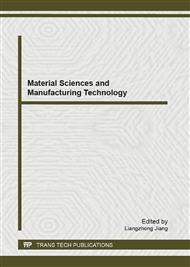[1]
Pudota Nirmala, et, al. Automatic Keyphrase Extraction and Ontology Mining for Content-Based Tag Recommendation. INTERNATIONAL JOURNAL OF INTELLIGENT SYSTEMS, 2010; 25(12): 1158-1186.
DOI: 10.1002/int.20448
Google Scholar
[2]
Wan Xiaojun, Xiao Jianguo. Exploiting Neighborhood Knowledge for Single Document Summarization and Keyphrase Extraction. ACM TRANSACTIONS ON INFORMATION SYSTEMS, 2010; 28(2).
DOI: 10.1145/1740592.1740596
Google Scholar
[3]
El-Beltagy Samhaa R.; Rafea Ahmed. KP-Miner: A keyphrase extraction system for English and Arabic documents. INFORMATION SYSTEMS, 2009; 34(1): 132-144.
DOI: 10.1016/j.is.2008.05.002
Google Scholar
[4]
Mangina Eleni; Kilbride John. Evaluation of keyphrase extraction algorithm and tiling process for a document/resource recommender within e-learning environments. COMPUTERS & EDUCATION, 2008; 50(3): 807-820.
DOI: 10.1016/j.compedu.2006.08.012
Google Scholar
[5]
Hacohen-Kerner Yaakov, et al. Automatic machine learning of keyphrase extraction from short HTML documents written in Hebrew. CYBERNETICS AND SYSTEMS, 2007; 38(1): 1-21.
DOI: 10.1080/01969720600998546
Google Scholar
[6]
Gulla Jon Atle, et, al. Unsupervised keyphrase extraction for search ontologies. LECTURE NOTES IN COMPUTER SCIENCE, 2006; 3999: 25-36.
DOI: 10.1007/11765448_3
Google Scholar
[7]
Hammouda KM; Matute DN; Kamel MS. CorePhrase: Keyphrase extraction for document clustering. LECTURE NOTES IN ARTIFICIAL INTELLIGENCE, 2005, 3587: 265-274.
DOI: 10.1007/11510888_26
Google Scholar
[8]
Kilbride J; Mangina E. Automated keyphrase extraction: Assisting students in the search for online materials. LECTURE NOTES IN COMPUTER SCIENCE, 2005; 3528: 225-230.
DOI: 10.1007/11495772_35
Google Scholar
[9]
Wang HF; Li SJ; Yu SW . Automatic keyphrase extraction from chinese news documents. LECTURE NOTES IN ARTIFICIAL INTELLIGENCE, 2005; 3614: 648-657.
DOI: 10.1007/11540007_80
Google Scholar
[10]
Huang XC, et, al. Word segmentation and POS tagging for Chinese keyphrase extraction. LECTURE NOTES IN ARTIFICIAL INTELLIGENCE, 2005; 3584: 364-369.
DOI: 10.1007/11527503_44
Google Scholar
[11]
Gayo-Avello D; Alvarez-Gutierrez D; Gayo-Avello J. Naive algorithms for keyphrase extraction and text summarization from a single document inspired by the protein biosynthesis process. LECTURE NOTES IN COMPUTER SCIENCE, 2004; 3141: 440-455.
DOI: 10.1007/978-3-540-27835-1_32
Google Scholar
[12]
Chien LF. PAT-tree-based adaptive keyphrase extraction for intelligent Chinese information retrieval. INFORMATION PROCESSING & MANAGEMENT, 1999; 35(4): 501-521.
Google Scholar


